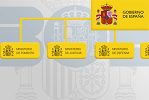Telecommunications services: getting connected
Content
The rights of telecommunications users
The General Telecommunications Law![]() and the Charter of rights for users of electronic communications services
and the Charter of rights for users of electronic communications services![]() recognise a number of specific rights for users in this sector.
recognise a number of specific rights for users in this sector.
Telecommunications User Support Office
The Telecommunications User Support Office![]() has two main functions:
has two main functions:
- to inform users of their rights; and
- to inform users on how to make a complaint to the Office against a telecommunications service provider in the event of a dispute.
Fixed-line and mobile telephone services, internet access, voice and data packages
Telecommunications rules set out the specific rights of users of fixed-line and mobile telephone services, internet access services and voice and data services.
These rights are listed on the Telecommunications User Support Office website:
Right to a connection. Universal service
All citizens have the right to a connection to the fixed-line telephone network.
This connection must allow the user to make and receive calls and to have internet access with a download speed of 1 Mbit/s.
The designated universal service provider in Spain
The universal service provider in Spain is TELEFÓNICA DE ESPAÑA, S.A.U.
This provider is required to provide a connection to the fixed-line telephone network which includes functional internet access.
The TELEFÓNICA DE ESPAÑA, S.A.U. website address is www.movistar.es![]() .
.
The helpline number is 1004.
Payment of universal service connection fee
In order to obtain a telephone line from the universal service provider (TELEFÓNICA DE ESPAÑA), a connection fee must be paid.
Homes which already have a connection
Where a home already has a connection, the only thing the user needs to do in order to access the existing fixed phone line and internet connection is request activation of the service by the provider.
All providers who are in a position to provide the service are to do so under a contract concluded with the consumer.
If no provider is found, TELEFÓNICA DE ESPAÑA, as Spain’s designated universal service provider, is obliged to provide the service.
New connections
Where a home does not have a fixed phone line connection, the only thing the user needs to do in order to have access to a fixed phone line and internet service is request installation of the line by the provider.
All providers who are in a position to provide the service are to do so under a contract concluded with the consumer.
If no provider is found, TELEFÓNICA DE ESPAÑA, as Spain’s designated universal service provider, is obliged to provide the service.
The right to switch provider
All users of fixed-line and mobile telephone services and internet access services have the right to switch to a different provider at any time.
If users switch between fixed-line or mobile telephone service providers, they have the right to keep (port) their existing phone number.
Users have the right to port:
- their existing fixed-line number if they are switching provider without changing the physical location of the line; and
- their existing mobile number under any circumstances.
In order to change provider and keep (port) your existing number, all you need to do is send a request to the new provider (the gaining provider), who will coordinate it with the old provider (the losing provider).
If you are looking to switch provider without porting your number (i.e. switch internet or phone service provider, but not keep your existing number), you will need to cancel with the old provider and activate the service with the new one.
More information on portability can be found here:
Price comparison
There is currently no official website with a price comparison tool allowing you to compare prices from different providers.
However, there are numerous private price comparison sites.
Complaints
Any telecommunications user who considers that his/her rights have been infringed can make a complaint.
The Telecommunications User Support Office![]() can provide information on the following:
can provide information on the following:
- What can I make a complaint about?
- What types of complaints procedures are there?
- Who can make a complaint?
- How can I make a complaint?
- What information needs to be included in the complaint?
- How can I request an update on my complaint?
Non-payment of bills
The consequences of a user’s failure to pay a telephone bill differ depending on whether the bill is for fixed-line or mobile telephone services.
- In the case of fixed-line services, the provider must send the user a demand for payment. If the user fails to pay, the provider may suspend all outgoing calls, other than emergency calls, for two months. If the non-payment continues, the provider may disconnect the line.
- There is no specific regulation for mobile telephone services, so the consequences of non-payment, which include the possibility of the service being disconnected, are set out in the provider’s general terms and conditions.
People on low incomes
Universal service for telecommunications requires that TELEFÓNICA DE ESPAÑA offer people on low incomes a ‘social tariff’, by discounting the connection charge and the monthly rental fee.
In order to be eligible for the social tariff, certain requirements must be met. Specifically, it is aimed at retired people and pensioners whose household income does not exceed 120 % of the Multiplier for the Public Income Index.
It consists of a 70 % discount on service activation or connection charges for landlines, and a 95 % discount on recurring rental fees for landlines.
Assistance for users with disabilities
Universal service
As part of universal service, TELEFÓNICA DE ESPAÑA is required to provide special assistance to users with disabilities.
Information on this assistance![]()
Other providers
Outside of universal service, other providers have also put measures in place in order to guarantee that people with disabilities can gain equal access to telecommunications.
To find out about those measures, contact the providers’ customer service departments.
Information for each Autonomous Community







Andalucía Aragón Asturias, Principado de Balears, Illes Canarias Cantabria Castilla y León Castilla-La Mancha Cataluña Ciudad de Ceuta Ciudad de Melilla Comunitat Valenciana Extremadura Galicia Madrid, Comunidad de Murcia, Región de Navarra, Comunidad Foral de País Vasco Rioja, La










